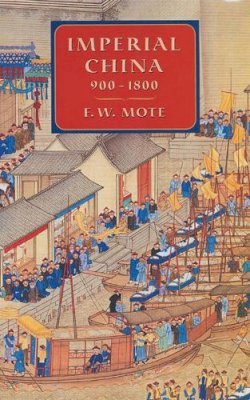
Imperial China 900-1800
F. W. Mote
This is a history of China for the 900-year time span of the late imperial period. A senior scholar of this epoch, F. W. Mote highlights the personal characteristics of the rulers and dynasties and probes the cultural theme of Chinese adaptations to recurrent alien rule. No other work provides a similar synthesis: generational events, personalities, and the spirit of the age combine to yield a comprehensive history of the civilization, not isolated but shaped by its relation to outsiders.
This vast panorama of the civilization of the largest society in human history reveals much about Chinese high and low culture, and the influential role of Confucian philosophical and social ideals. Throughout the Liao Empire, the world of the Song, the Mongol rule, and the early Qing through the Kangxi and Qianlong reigns, culture, ideas, and personalities are richly woven into the fabric of the political order and institutions. This is a monumental work that will stand among the classic accounts of the nature and vibrancy of Chinese civilization before the modern period.
Product Details
About F. W. Mote
Reviews for Imperial China 900-1800
Victor Cunrui Xiong
Chinese Historical Review
A personal meditation on the later imperial history of China by an author who has studied and taught the subject all his life and whose knowledge of it is truly formidable. It is written in a readable, accessible style that attracts the reader’s sustained attention.
John W. Dardess, University of Kansas A major contribution to our present literature on the general historiography of late Imperial China. Not only is it eminently accessible to a wide nonspecialized intellectual public, it also provides a major corrective within the field to some of the tendencies that have dominated the writing of Chinese history. Mote has highly cogent things to say about the nature of what has been called the ‘gentry’ in China and highly relevant questions to raise about the notion of a demographic explosion in eighteenth-century China and examines many of the prevailing abstract conceptions which dominate the field. Yet, he vividly demonstrated how limited our effort has been to explore in depth the vast documentary materials available to us, which are supposed to provide the ‘empirical data’ for our models, paradigms, and structural theories. Mote’s major contribution is his detailed account of the growing complexity of relations between the Chinese state and the surrounding East Asian world during the period 900–1800.
Benjamin I. Schwartz, Harvard University
